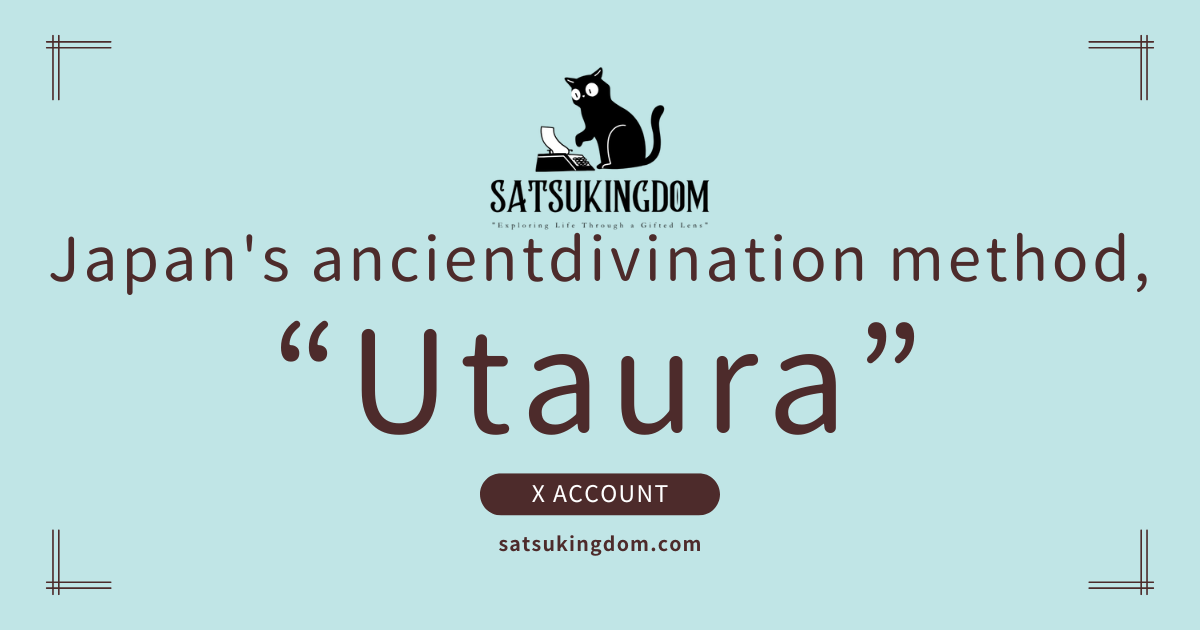This time, I’ll be talking about “Utaura” (song divination), a form of divination using Japanese waka poetry that I encountered while studying tarot card reading.
The Origin of Utaura
Tarot cards are said to have existed since Japan’s Muromachi period, but it seems Japan also had divination practices similar to tarot readings since ancient times.
Its origins are said to date back to the Heian period, when it was performed as part of shamanic rituals.
The original form of utaura involved individuals possessing spiritual abilities, known as miko (female shrine maidens) or otokomiko (male shrine priests), reciting waka poetry while in a state of divine possession—a state where the gods descended and took up residence within them. These waka poems were considered messages from the gods.
That waka poem was not one that had existed previously, but rather a new waka poem that seemed to have been spoken on the spot as an oracle from the deity.
The Heian-period text Jikkinshō records that a shrine maiden conveyed a waka poem expressing the divine will to the people. This waka was regarded as a special poem composed on the spot as a direct message from the gods.
Transition
Around the Muromachi period, it began to spread in a modified form, much like the origins of tarot cards. Instead of priestesses composing waka poems directly, they began drawing cards or strips of paper inscribed with waka. Noh plays created during the Muromachi period included a piece called “Utaura” (Poem Divination), featuring a man who traveled the provinces performing divination through waka. The fact that it became a play suggests that poem divination was widely known among people at the time.
During this period, priestesses did not compose waka directly; instead, pre-existing waka were used. These were not limited to specific anthologies; it is thought that a wide variety of waka were employed.
For example, the following types can be inferred:
- Waka Poems in Myths and Legends
The origin of uraura lies in the belief of receiving divine revelations through waka poetry. Therefore, it is thought that waka poems appearing in mythology, such as the song “Yakumo tatsu” (Clouds gather), said to be the first waka composed in Japan by Susanoo-no-Mikoto, were used. - Waka poems from the Manyoshu
The Man’yōshū, Japan’s oldest anthology of waka poetry, contains several poems about “ Tsujiura” performed to wish for the fulfillment of love. These divination-related poems may have served as the roots of Utaura. - Waka poems said to have been composed by the gods
Waka poems said to have been composed by priestesses in a trance during the Heian period. These were believed to have been directly bestowed by the gods for divination purposes. It is possible that some of these waka, preserved through oral tradition, were used.
Spreading through books of Utaura
By the Edo period, books on Utaura began to be published. Books dealing with divination have always been popular, it seems. At that time, a book called Hyakunin Isshu Utaura-sho, linked to the Hyakunin Isshu anthology established in the Kamakura period, was published. Its method of divination resembled tarot cards,
- Turn all the Hyakunin Isshu cards face down and shuffle them.
- Focus your mind on the matter you wish to divine (work, love, etc.).
- Draw one card and interpret the waka poem written on it.
The steps described above are shown.It seems the idea was to gain insight into one’s troubles by interpreting the scenes and emotions embedded in waka poetry in relation to one’s own circumstances.
Regardless of the era or place
It’s both mysterious and fascinating how similar things emerge across different eras and countries. The desire to know what lies ahead, to uncover the truth, remains constant throughout history. If we look beyond specific forms, records of divination seem to exist even in ancient civilizations dating back to around 3000-4000 BC.
I first learned about this “Utaura” while studying tarot. However, it’s said that the inclusion of waka poems in the “omikuji” fortune slips still drawn at many shrines today is a remnant of the belief that waka poems were divine revelations—a vestige of the concept of Utaura. Discovering that ancient culture remains rooted in such familiar places evokes a profound sense of emotion.



コメント